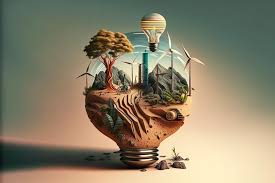As the world grapples with the escalating effects of climate change, technology emerges as a powerful ally in the fight for sustainability. From renewable energy solutions to eco-friendly products, innovations in technology are paving the way for a more sustainable future. This article delves into how various technological advancements are addressing climate change, enhancing energy efficiency, and promoting environmentally friendly practices.
The Role of Technology in Combating Climate Change
- Renewable Energy Solutions: One of the most significant advancements in sustainable technology is the development of renewable energy sources. Solar, wind, and hydroelectric power are leading the charge in reducing reliance on fossil fuels. Innovations in solar panel efficiency, such as bifacial solar panels and perovskite cells, are making solar energy more accessible and cost-effective. Wind energy has also seen advancements with larger and more efficient turbines that can generate more power in lower wind conditions.
- Smart Grids: Smart grid technology enhances the efficiency and reliability of electricity distribution. By integrating digital technology into the electrical grid, smart grids can better manage electricity flow, reduce energy waste, and accommodate renewable energy sources. This technology allows for real-time monitoring and optimization of energy use, leading to a more resilient energy infrastructure.
- Energy Storage Solutions: The intermittent nature of renewable energy sources necessitates effective energy storage solutions. Innovations in battery technology, such as lithium-sulfur and solid-state batteries, are improving energy storage capacity, efficiency, and lifespan. These advancements enable the storage of excess energy generated during peak production times, ensuring a stable energy supply when demand is high.
- Electric Vehicles (EVs): The automotive industry is rapidly transitioning towards electric vehicles as a sustainable alternative to traditional gasoline-powered cars. EVs produce zero tailpipe emissions, significantly reducing air pollution. Innovations in charging infrastructure, battery technology, and vehicle design are making electric vehicles more appealing and accessible to consumers.
- Eco-Friendly Products: Many companies are now focusing on creating eco-friendly products that minimize environmental impact. From biodegradable packaging to sustainable textiles, innovations in materials science are driving the development of products that are both functional and environmentally responsible. Brands are increasingly prioritizing sustainable practices in their supply chains, ensuring that their products contribute to a circular economy.
- Smart Home Technology: Smart home devices are helping consumers reduce energy consumption and lower their carbon footprint. Smart thermostats, energy-efficient appliances, and home automation systems allow users to monitor and optimize their energy use. For instance, smart thermostats can learn user habits and adjust heating and cooling accordingly, leading to significant energy savings.
- Agricultural Technology: Technology is revolutionizing the agricultural sector through precision farming and sustainable practices. Innovations such as drones, IoT sensors, and AI-driven analytics enable farmers to monitor crop health, optimize resource use, and reduce waste. Sustainable agricultural practices, such as vertical farming and hydroponics, are also gaining traction, allowing for food production with minimal environmental impact.
- Carbon Capture and Storage (CCS): CCS technologies are being developed to capture carbon dioxide emissions from industrial processes and store them underground or utilize them in various applications. By mitigating the impact of greenhouse gas emissions, CCS can play a crucial role in achieving net-zero targets.
The Future of Sustainable Technology
As technology continues to evolve, the future of sustainable innovations looks promising. Here are some trends to watch:
- Increased Focus on Circular Economy: The circular economy model emphasizes minimizing waste and maximizing resource efficiency. Businesses are increasingly adopting this approach, designing products with end-of-life considerations in mind, and promoting recycling and reuse.
- AI and Machine Learning in Sustainability: Artificial intelligence (AI) and machine learning are becoming integral in developing solutions for climate change. From optimizing energy consumption to predicting climate patterns, AI can analyze vast amounts of data to drive informed decision-making in sustainability efforts.
- Blockchain for Transparency: Blockchain technology can enhance transparency in supply chains, allowing consumers to verify the sustainability of products. By providing a tamper-proof record of a product’s journey, blockchain can help ensure ethical sourcing and production practices.
- Collaboration and Partnerships: Collaboration between governments, businesses, and non-profit organizations is vital for driving sustainable innovations. Partnerships can facilitate knowledge sharing, funding, and resource allocation, accelerating the development and implementation of sustainable technologies.
- Public Awareness and Education: As consumers become more aware of climate change issues, there is a growing demand for sustainable products and practices. Education and awareness campaigns can empower individuals to make informed choices, further driving the adoption of sustainable technologies.
Conclusion
Sustainable tech innovations are crucial in addressing climate change and promoting environmental stewardship. By harnessing the power of technology, we can create a more sustainable future that balances economic growth with ecological preservation. The transition to renewable energy sources, smart technologies, and eco-friendly products presents an opportunity for individuals, businesses, and governments to work together toward a common goal: a healthier planet for generations to come.




